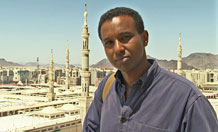
Rageh Omaar - BBC2 ‘The Life of Muhammad’
Exeter academic contributes to new TV series on Islam
A University of Exeter academic, who is an expert on Islam, has contributed to the new television series ‘The Life of Muhammad’ currently being broadcast on BBC Two. The three-part documentary, presented by journalist Rageh Omaar, charts the story of the Prophet who, in little more than 20 years, changed the world forever.
Professor Sajjad Rizvi, University of Exeter’s Associate Professor of Islamic Intellectual History at the Institute of Arab and Islamic Studies, provided expert advice to the BBC team. He also appears in the series.
Rageh Omaar travels to the place of Muhammad’s birth to re-trace the actual footsteps of the Prophet. The journey starts from Muhammad’s humble beginnings in Mecca, to his struggles with accepting his Prophetic role and the founding of the first Islamic constitution. The programme also raises questions about Islam’s role in the world today and explores where Islam’s attitudes towards money, charity, women, social equality, religious tolerance, war and conflict originated.
Filmed on location in Saudi Arabia, Jerusalem, Turkey, Syria, the USA, the UK and Jordan the series draws on the expertise and comment from some of the world’s leading academics and commentators on Islam.
Professor Rizvi commented: “The aim of this new series is to introduce the historical personality of Muhammad and try to help viewers understand what significance he holds for Muslims especially in the contemporary world. Given the polemics and conflicts that exist today, a better understanding of the origins of the faith and its meaning for believers will contribute to a more informed debate on the relationship between faith, politics and modernity for our world.”
Professor Rizvi is currently involved in a research project ‘Contextualising Islam in Britain’, with the University of Cambridge and Westminster. It looks at some of the most contentious issues affecting Muslims in Britain. The initiative first ran in 2009 and brought together 30 Muslim academics and practitioners to address a range of topics which were compiled and published online. The project was conceived and funded through the last government’s ‘Prevent’ strategy, which was established to combat extremism. It will, however, be fully independent of both the Government and of the universities involved.
Professor Rizvi said: “We will be producing a set of critical perspectives on what it means to be a Muslim living in Britain today. In particular, the project will aim to offer ideas and conclusions about aspects of British citizenship that do not appear, at least at first, to be in harmony with the teaching of the Islamic faith.”
The University of Cambridge has hosted a further four conferences; the four main themes are: the individual and the community; family and education; gender - equality, identity and sexuality; and political participation and community. Questions have been proposed under each of those headings for discussion, many tackling difficult and controversial subjects. They include: “Is all the political attention around Muslim education entirely unjustified or are there grounds for taking some of this criticism on board?”; and: “How should British Muslims deal responsibly and compassionately with gay Muslims and gay Muslim groups, rather than rendering them invisible and ignoring their issues about discrimination and bad treatment within the community?” At the completion of this phase, a road-show of presentations and events aimed at the academic and wider communities will take place around the country, including in Exeter.
The final report, presenting the full set of conclusions and the list of participants, is scheduled for release by the University of Cambridge’s Centre of Islamic Studies in September 2011.
Date: 18 July 2011
